
AfD’s online movements: activism or slacktivism?
Do social media activists have an important role to play, or is it all slacktivism and should protestors go to the streets if they want to make an impact?
AfD's resistance and supporting movements
Germany’s Christian far-right party Alternative für Deutschland (AfD) has won 12.6% of votes during the most recent elections, which makes them the third-largest party in German politics (Clarke, 2017). The AfD is the first far-right party to enter the parliament since World War II (Ellyatt, 2017). According to a recent study of Bertelsmann Stiftung (2017), much of AfD’s growing support is due to its refugee policy. The AfD supports direct democracy and a separation of state powers. However, the AfD has also been accused of advocating neo-Nazi ideas and using neo-Nazi discourse. AfD is very conservative and a defender of the traditional nuclear family, which consists of two parents of opposite genders and their children. This contrasts sharply with types of families that consist of more than two parents, or single parent households. The AfD is also anti–abortion and hostile to ‘alternative lifestyles’ (Chase, 2017).
A large part of the opposition consists of left-wing parties and activists and LGBTQ-activists. AfD’s group of supporters consists mostly of extreme right-wing activists, Neo-Nazis, people who are anti–refugees and immigrants, homophobic people and christian fundamentalists. These supporters are also part of a growing online movement. In this article, I will analyse AfD’s online supporting movements to find out if they are slacktivists.
AfD’s online support system as a networked social movement
The AfD has a large online support system. The movement protests against other political opponents by using specific hashtags, creating content on Youtube and by sharing memes. They are trying to create propaganda with an 'edgy feel' and push it in a network of different media. The supportmovement can be considered a polycentric networked movement that is partly organized and partly organic. Castells’ (2013) conception of online activism and more in particular his defintion of networked social movements is only partially useful in understanding online activism supporting the AfD.
The movement supporting the AfD gained momentum during Merkel’s refugee policy. Activists wanted to build support for a new right movement and for the AfD in particular. According to Castells (2013), networked social movements are ‘’usually triggered by a spark of indignation either related to a specific event or to peak of disgust with the actions of rulers’’. In this case the, the spark that triggered the activism was Merkel’s refugee policy. However, Castells (in: Levy, 2016) also argues that networked movements are leaderless and are a spontaneous, online-mediated reaction. This is where the support movement for the AfD doesn't fit the profile of a networked social movement. Within this movement you can identify multiple leaders that instruct their ‘followers’ (Maly, 2017).
One of the leaders within this movement is Nikolai Alexander, who is the creator of ‘Reconquista Germanica’, a Youtube channel that publishes political videos and has 33,000 subscribers. Alexander tries to convince his subscribers in a 17-minute video to move to Discord, which is originally a communication platform for gamers. He wants to use this platform because it makes it easier to organize online attacks. Using the strategy of moving users from Youtube or others platforms such as 4chan to Discord is not new. Discord also played a big role in the organization of the protests in Charlottesville (Schmehl & Broderick, 2017). This makes it clear that this movement is anything but spontaneous. It has clear goals and strategies to achieve those goals.
Hashtags #LautGegenMerkel and #WegMitMerkel
Reconquista Germanica, protests against Merkel, the AfD’s biggest opponent, on social media by using the hashtags #LautGegenMerkel (loudly against Merkel) and #WegMitMerkel (away with Merkel).
The hashtag #LautGegenMerkel is used by right-wing supporters to protest against Merkel. The issue the users of this hashtag are concerned with is, for the most part, Merkel’s refugee policy. They believe this policy is the cause of a lot of problems in Germany, such as a lack of safety, which is mentioned by a user in theimage below. Furthermore, the users of this hashtag also believe refugees are a burden on social life and the economy.

Tweet by @yuma_1975 #LautGegenMerkel
‘’Merkel has est durch ihre blöde Asylpolitik geschafft, dass Deutschland nun auf Platz 51 (!) der sichersten Länder ist’’ (‘’Through her stupid refugee policy, Merkel has managed to make Germany just number 51 (!) of the safest countries’’)

Reply by @SpohnMichael
One Twitter user replies that ‘’Auf Platz 51 ist wohl kaum noch die Rede von ‘’sicher’’ (‘’On place 51 there is hardly any ‘’safety’’). This tweet and the interactions it starts, is a clear example of spreading ‘fake news’. In this context, ‘fake news’ is best considered as a political phenomenom. If we look at fake news with George Sorel's (in: Maly, 2018) concept of myth in mind, we see that fake news makes sense as an instrument of political mobilization. According to Sorel (1907) myths are ‘’not descriptions of things, but expressions of a determination to act’’. Myths can form the political opinion of people. These stories exist and are true in the minds of people. The actions of people bring these stories, which are imagined perceptions, to life and they create a new reality (Kassab, 2016).
The news that the user "Yuma" is spreading in this tweet can be considered an example of such a ‘mythical’ effect for multiple reasons. In his tweet, Yuma refers to an article published on Breitbart.com: ‘’Terror risk sees germany slump to 51st place for security in world tourism rankings’’. This website is known for for its new right, nationalistic, anti-Islam and anti-migration editorial line and its support for Trump. The article states: ‘’travellers have become wary of the security situation in Germany since Chancellor Angela Merkel opened Germany’s borders to well over a million people from the third world in 2015, resulting in the country being hit by a series of high-profile terror attacks'' (Hale, 2017). The writer of this article uses Germany’s place in safety and security in tourism rankings and blames it on Merkel’s refugee policy. However, the real reason that Germany has placed 51st in this ranking is that it isn't based on numbers of terror attacks, but on the perception of 200 respondents and a research report that contains faulty data (Arab, 2017).
The Breitbart article and Yumo’s tweets are questionable if we look at it from a rational and factual point of view. However, if we understand them as myths, we see how they function as powerful political mobilization tools. They go viral, they trigger people and touch their emotions (Maly, 2017). There are people that try to co-create reality, in this case, because the person is trying to deceive people in believing that Germany is an unsafe country and linking this to Merkel’s asylum policy. The goal is to make sure that Merkel loses support and the AfD gains support. While spreading fake news, the supporters are waging a discursive battle of meaning. According to Maly (2014), discursive battles are being ‘’waged over the definition of words, the interpretation of facts, the understanding of the ideology or the general image of the party’’. In this particular case, the person is waging a discursive battle to let people know that Germany has poor safety and security and the reason for that is Merkel’s refugee policy. This policy is making sure that the German population is not protected from terroristic attacks and is not only doing nothing to improve the situation, but is only making it worse.

Tweet by @Jan_84_original #WegMitMerkel
‘’Merkel = noch viel viel mehr Ausländer = Untergang Deutschland’’ (‘’Merkel = many many more foreigners = downfall Germany’’)
The hashtag #WegMitMerkel is also used to protest Merkel and her refugee policy. This hashtag indicates that they do not want Merkel in the German parliament. People who use both of these hashtages have usually dedicated their profile to politics and it usually contains tweets protesting against opposing groups and politicians, retweets from other people who share their views, and tweets that share news that provetheir point. Such activistic profiles are set up for purely political causes and are automated as part of a botnetwork in a lot of cases. Especially profiles that contain little personal information and produce a huge amount of tweets in a short period of time are likely bots.
Bots are needed to make hashtags trending and to increase the amount of retweets and likes on a tweet. The risk of using 'ideological' hashtags and bots with a very explicit activistic profile is that tprotests does not reach the opponents. As such, and as a result of the personalization algorithms chances are real that they will contribute to the establishment of a ‘filter bubble’. The term filter bubble was coined by Eli Pariser, who defines it as ‘’that personal ecosystem of information that’s been catered by these algorithms’’ (Pariser, 2011). In other words, what you see online is personalized based on past click behavior, search history and preferences, which results in users being isolated from information that differs from their own vpoints of view. This means people who do not support AfD will likely not come into contact with these hashtags or other media produced by the AfD or its supporters, unless it is directly targeted at them by mentioning or replying to them, or leaving messages under media the people they are trying to reach, will likely see.

Profile of @n59_puppche. Example of a bot. 74K tweets since April 2016.
AfD-Chan
This activism in favour of AfD cannot be understood as a purely local affair. It's connected to and integrated in a global new right niche (Maly, 2018). Concretely, we see that New Right movements from all over the world are embedded in digital infrastructures like Discord, YouTube and 4chan. German, Dutch, Brittisch, Swedish and American activists come together in these infrastructures, meet and sometimes collaborate on national causes.
The AfD activists were clearly visible and organizing their battle against Merkel in a thread on 4chan. This message board is used by AfD supporters in a similar way as Discord for Reconquista Germanica. People on 4Chan discuss their strategy, which was to start a meme war, hoping to influence the outcome of the election. However, the difference between Reconquista Germanica and 4Chan is that 4Chan is truly global. It is used to gain global support from the new right niche. Everything is written in English. Summaries of what AfD stands for are used to mobilize global activists. This is not a spontaneous action but something that they have been working on since February 2017 (Schmehl, 2017).
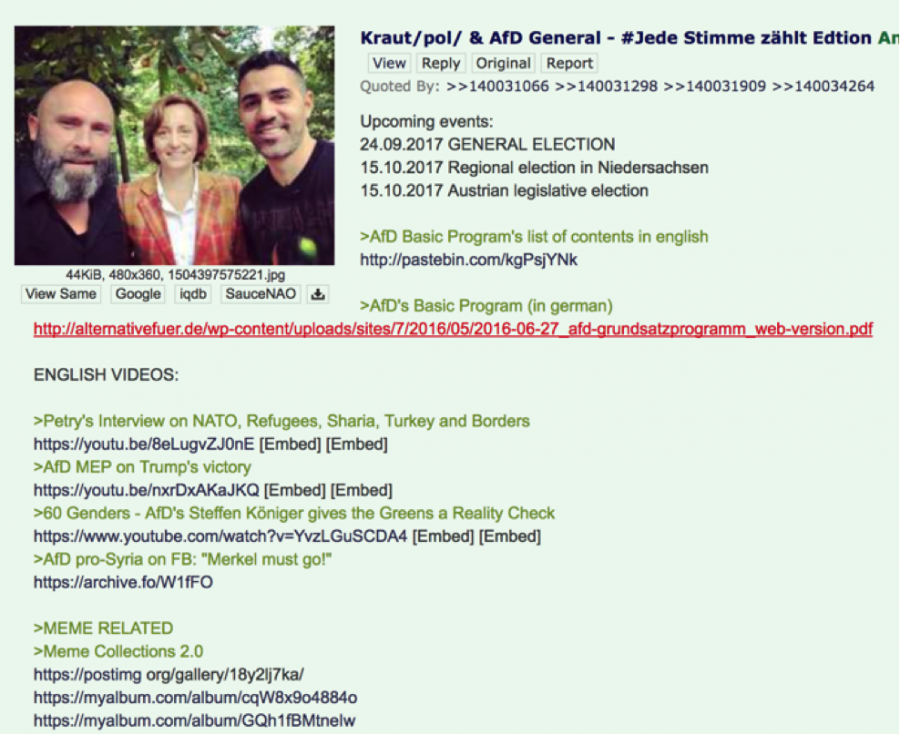
Screenshot 4Chan
The AfD trolls are inspired by right wing movements from France and the United States and use similar strategies. On 4Chan, dates are mentioned that serve as goals, videos are shared that explain the position of the AfD and links to archives with pro AfD memes are posted.
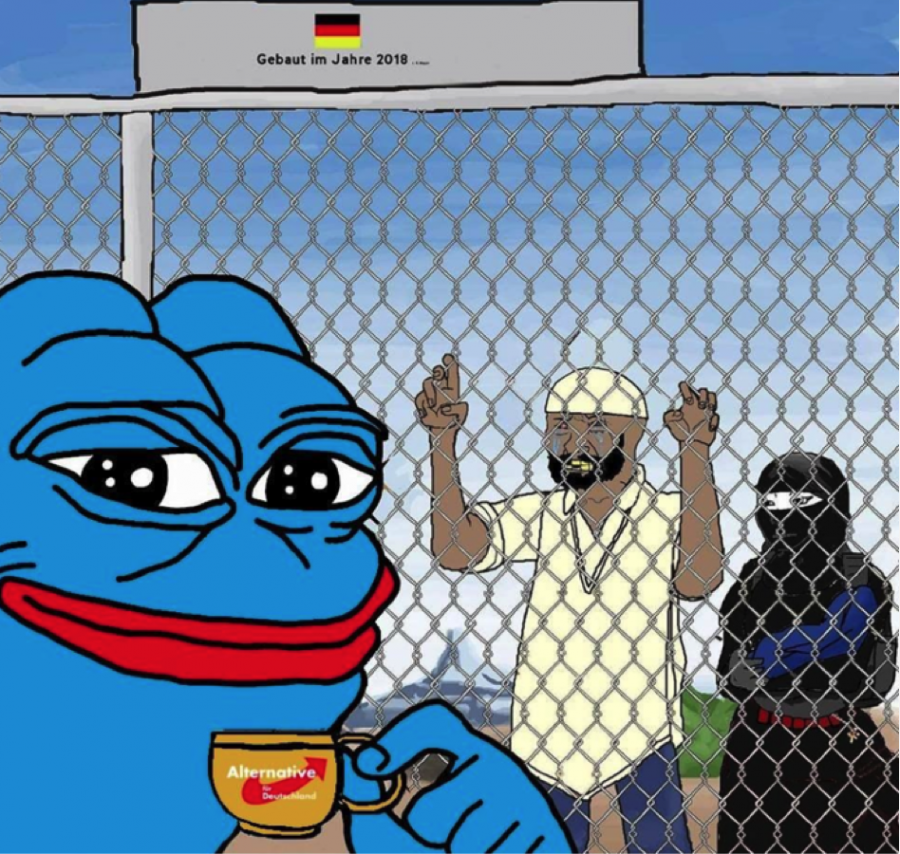
AfD Pepe the Frog
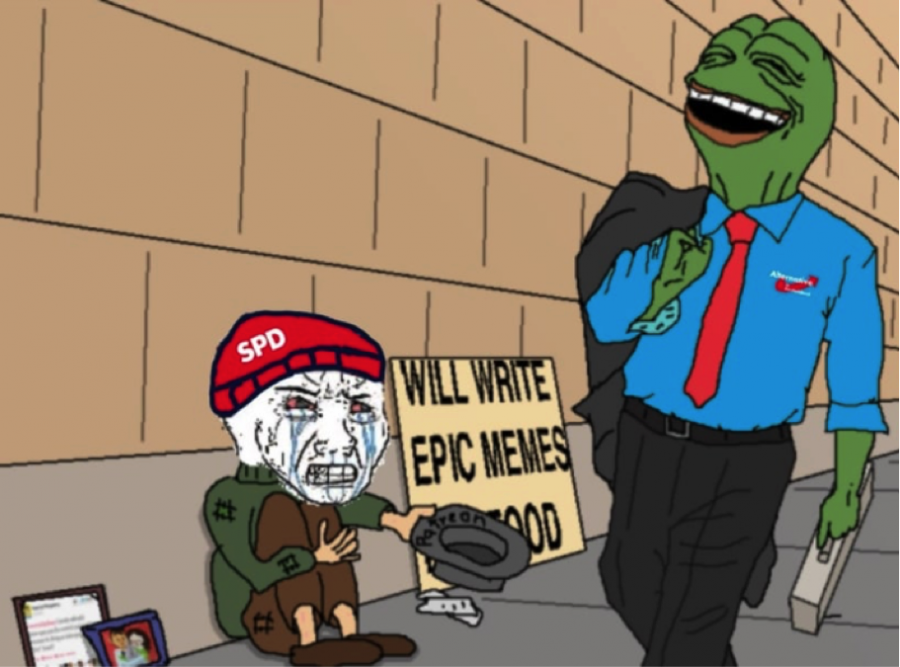
AfD Pepe the Frog
Three types of memes can be identified. One meme that appears a lot on social media is a mix of AfD symbols and Pepe the Frog. Pepe the Frog is popular in the United States and a symbol for the alt-right movement. In these AfD memes, we see how an American emblem of the alt-Right - Pepe - is becoming a global emblem of the New Right online battle (Maly, 2018). When Pepe is used in these local national battles, he becomes local or deglobalized: the AfD pepe is blue and the people he wants to keep out the country are not Mexicans anymore (as was the case in the American meme), but Muslims. On Pepe's cup, we see the logo of the AfD. Deglobalizing memes also means that the meme needs to be translated and converted fromEnglish to German. They are made local, by rehashing of existing symbols and AfD symbols, which draws attention, makes them recognizable and easy to understand. That reworking of memes is partially organized in 4chan.

Screenshot 4Chan
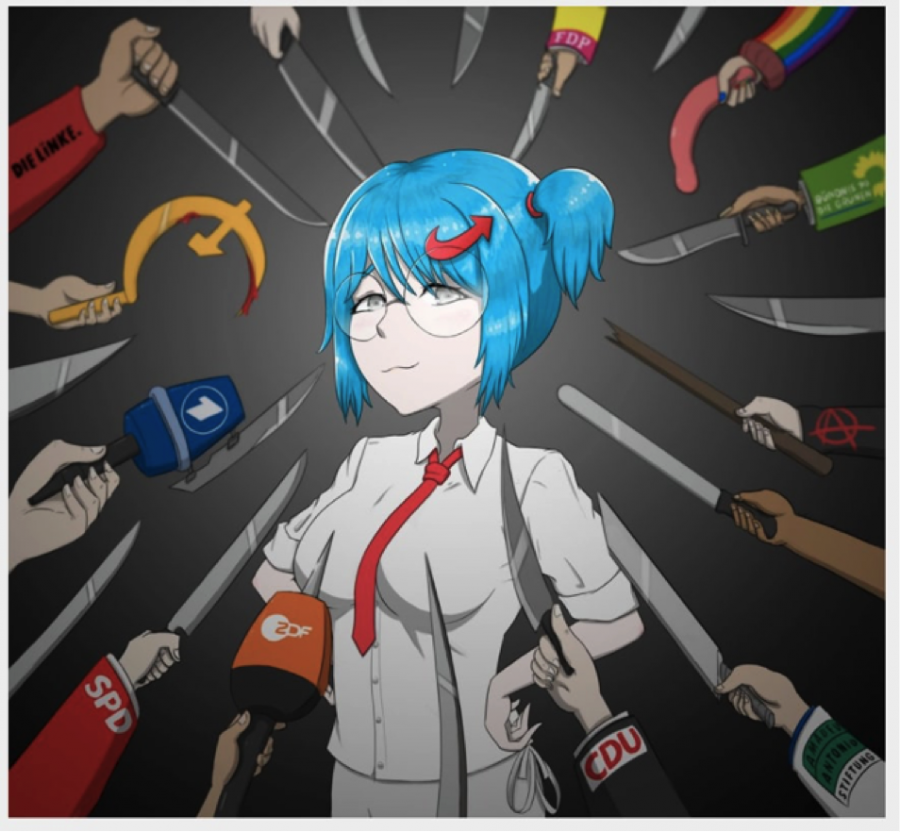
Afd-Chan
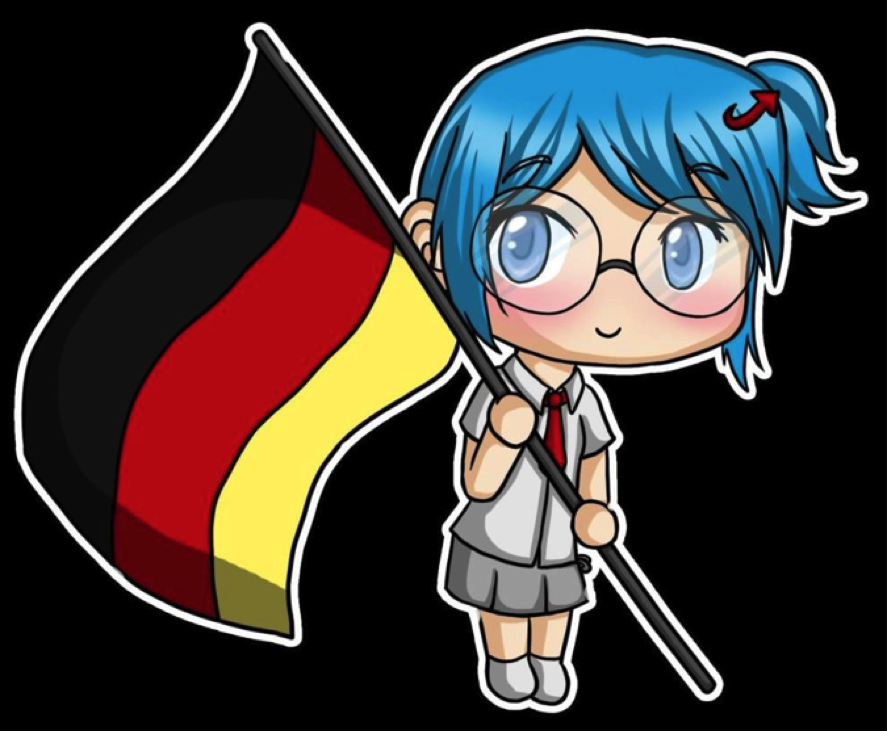
Afd-Chan
A big number of memes revolves around an AfD manga character called Afd-Chan This character is portrayed as a blue-haired teenage girl, typically with a red AfD arrow hairpin and a red tie. The main goal of these memes is to try to make the position and issues of the Afd easily understandable for people, so that they do not choose to vote for Merkel. Sometimes, AfD-Chan is portrayed with other memes or symbols that are associated with the far-right. In the image below, AfD-Chan is portrayed with ‘German Michel’ who has been a symbol of German nationalism. He is usually drawn wearing a nightcap. Afd-Chan is pouring him coffee in this image. The message is that he must wake up ("Meet AFD-Chan And Putsch-Chan, The Anime Girl Mascots Of The German Far Right", 2017).

Afd-Chan and German Michel
Slacktivism
'Slacktivism' is a combination of the words 'slacker' and 'activism' and can be defined as: ''The practice of supporting a political or social cause by means such as social media or online petitions, characterized as involving very little effort or commitment'' (''Slactivism'', n.d). The activists of the movements Reconquista Germanica and 4Chan are fighting for the same goals, and they do this by using the same strategies. They are fighting under the same hashtags and use the same symbols and memes. The best way of understanding this type of activism is by looking at it as contemporary propaganda. From that perspective, their strategy works because they succeed in pushing their hashtags to go viral. They aim for virality to let the voice of AfD circulate, to popularize that voice and to silence the opposition. These people are not just pretending to advocate a social cause, they are committing time to this effort. This means that Reconquista Germanica and 4Chan are not considered 'slacktivism'. They are not trying to impress others with their 'social awareness', nor is this an act to add to the gratification of their own egos (Telofski, 2012). They are waging a discursive battle for meaning, while spreading the voice of the AfD. The leaders of these groups make sure the movement is mobilized and the people are active contributers to this movement.
References
Arab, A. (2017). Reisesicherheit: Deutschland nur auf Platz 51 laut Weltwirtschaftsforum - WELT. DIE WELT. Retrieved 25 November 2017
Breitbart - Media Bias/Fact Check. (2017). Media Bias/Fact Check. Retrieved 25 November 2017
Burton, J. (2017). The 25 Safest Countries In The World. WorldAtlas. Retrieved 28 November 2017
Chase, J. (2017). AfD: What you need to know about Germany's far-right party. DW.COM. Retrieved 18 October 2017
Clarke, S. (2017). German elections 2017: full results. the Guardian. Retrieved 18 October 2017
Ellyatt, H. (2017). 'I am afraid': First far-right party set to enter German parliament in over half a century. CNBC. Retrieved 17 October 2017
Hale, V. (2017). Terror Risk Sees Germany Slump to 51st Place for Security in World Tourism Rankings - Breitbart. Breitbart. Retrieved 25 November 2017
Kassab, H. (2016). The power of emotion in politics, philosophy, and ideology (p. 64).
Levy, H. (2016). Book Review: Networks of Outrage and Hope: Social Movements in the Internet Age by Manuel Castells. LSE Review of Books. Retrieved 25 November 2017
Majority of German voters do not hold populist views. (2017). Bertelsmann-stiftung.de. Retrieved 18 October 2017
Maly, I. (2014). New media, new resistance and mass media
Maly, I. (2017). Digital Media and Politics Class 10.
Maly, I. (2018). Nieuw Rechts. Berchem: Epo.
Meet AFD-Chan And Putsch-Chan, The Anime Girl Mascots Of The German Far Right. (2017). Tameans.com. Retrieved 25 November 2017
Schmehl, K. (2017). Mit diesen Memes wollen AfD-Trolle die Bundestagswahl beeinflussen und in den "Meme-Krieg" ziehen. BuzzFeed. Retrieved 25 November 2017
Schmehl, K., & Broderick, R. (2017). A German YouTuber Tried To Make His Far-Right Hashtag Go Viral And It Was A Huge Flop. BuzzFeed. Retrieved 28 November 2017
slacktivism. Oxford Dictionaries | English. Retrieved 13 December 2017,
Sorel, G. (1907). Georges Sorel, letter to Daniel Halevy (1907). Historyguide.org. Retrieved 24 November 2017
Telofski, R. (2012). Living on a Meme: How Anti-Corporate Activists Bend the Truth, and You, to Get What They Want (p. 79). iUniverse Inc.